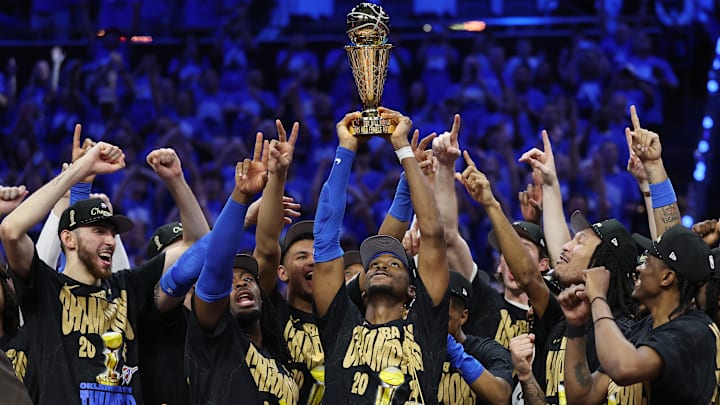The OKC Thunder head into the season as defending champions with remarkable continuity. As things currently stand, the ball club is bringing back a roster filled with players who logged 99.2 percent of the team’s playoff minutes last year.
Without question, this kind of continuity matters and is a great sign for things to come. However, for this roster, the single, organizing truth is depth.
Depth is a structural advantage, not a feel-good narrative. Last season, the Thunder’s title run hinged on timely contributions from role players like Isaiah Joe, who popped for heat-check shooting nights, Aaron Wiggins, who delivered late-game scoring, and Alex Caruso, whose defensive activity changed possessions.
Those moments were legacy performances because the organization had given those players real minutes and specific responsibilities during the regular season that bore fruit in the playoffs.
The urgency for that internal solution grew this offseason, as first-round pick Thomas Sorber tore his ACL in a workout last week and will miss the entirety of his rookie year, removing a planned interior option from the rotation.
That loss accelerates the timetable for homegrown depth pieces to assume bigger roles and forces the Thunder to rely on internal upgrades rather than immediate external fixes.
That is where the next wave matters.
Thunder depth is biggest key to championship repeat dreams
The club has signaled faith in Jaylin Williams with contract security and in-game reps, while the 7-foot Branden Carlson gives the Thunder a lengthy interior option who can alter matchups.
Those two are realistic, near-term answers when the team needs rim protection, screening, or finishing around the basket.
Carlson's role, in particular, will likely skyrocket from being a G-League bounce back to being a real contributor with the given opportunity. Teams that win repeat titles rarely do it with star power alone, but because their role players can convert minutes into momentum.
Practically, depth solves three problems at once.
First, it blunts the effect of injuries, because replacement minutes come from players already embedded in the system.
Second, it creates matchup leverage because Oklahoma City can present varying lineups that force opponents to adjust their strategies.
Finally, it protects Shai Gilgeous-Alexander, allowing him to attack in higher-percentage windows instead of shouldering every possession.
For a team built on aggressive rim pressure and a disruptive defense, that protection is as important as any trade or free-agent splash.
If the Thunder sustain targeted minutes for development, keep role players sharp in meaningful rotations, and continue trusting internal growth over quick fixes, depth will remain the team’s primary defense against the unpredictability of a title defense.
That blueprint produced this past spring’s championship. With Sorber sidelined and role players ready, the Thunder will test whether depth can do it again.
